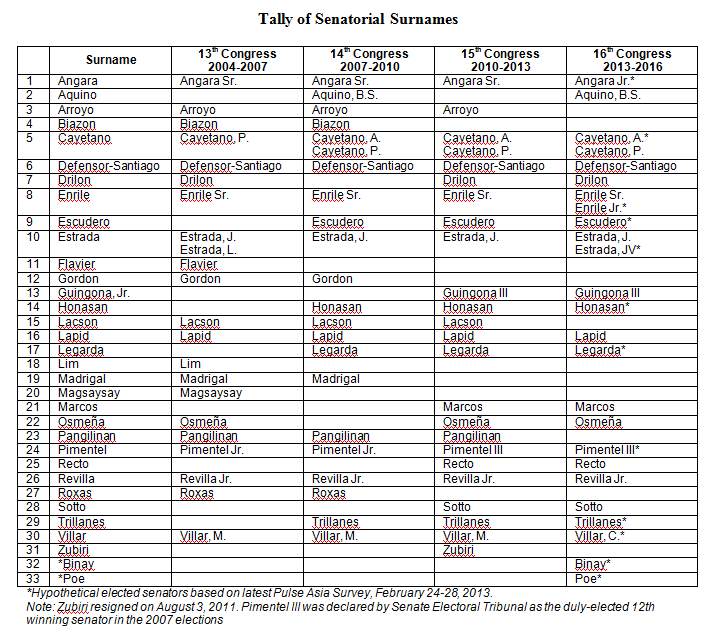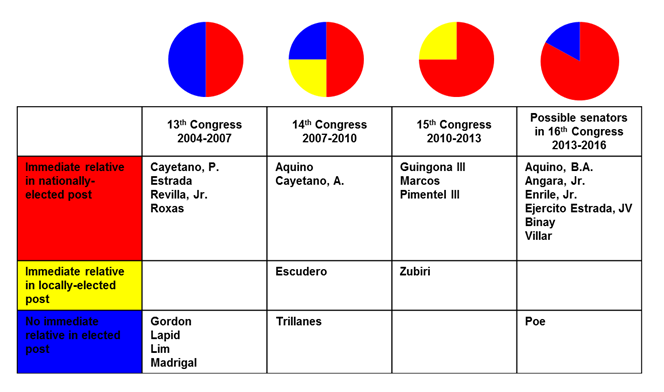by Dr. Nicole Curato
The outcome of this May’s midterm election concretizes a disturbing trend in the Philippine Senate. For the past nine years, the composition of the upper house has been increasingly drawn from a limited gene pool, posing issues on the inclusiveness and quality of representation citizens get from what is becoming an old surnames’ club.
From the thirteenth to the fifteenth congress, men and women from

Survival of the Fittest?
While it is not particularly surprising that incumbents get re-elected, what warrants further examination is the tendency for candidates with immediate relatives (defined as members from their nuclear family) that have held nationally elected positions to win a seat in the Senate. Of the sixteen new comers since the thirteenth congress, nine have immediate relatives that were either former senators or presidents. These include Benigno S. Aquino III, Jinggoy Estrada, Bongbong Marcos, Mar Roxas, Allan Peter and Pia Cayetano, TG Guingona, Koko Pimentel and Bong Revilla. Two of the sixteen also have immediate relatives who have been elected in local positions and began their political careers by taking their fathers’ seats in the House of Representatives. They are Chiz Escudero and Migz Zubiri.
If we focus the analysis to the profile of new senators for each congress, the “old surnames trend” becomes more observable. In the 2004 elections, half of the first termers had fathers that were either Presidents or Senators. The other half had no immediate relatives in elected posts but were either government officials from the executive branch such as Richard Gordon and Alfredo Lim or celebrities like Lito Lapid, Bong Revilla, and, to a certain extent, Jamby Madrigal who has extensively associated herself with the most bankable actress in her first run for the Senate. Compare this to the outcome of the 2010 elections. With the exclusion of Zubiri, all newcomers’ fathers were, at one point, the Senate President, Vice President or President of the Republic.

The composition of the Senate’s new comers in the sixteenth congress poses a high possibility for this trend to reach its peak. Except for Poe (who herself is dependent on her father’s political capital), this will be the first time that all senate new comers are directly related to politicians that have been elected to national positions. This leaves Trillanes as the only new senator who has made his way to the Senate in the past nine years without relying on genes or celebrity. It used to be the case that being a journalist, a basketball legend or an action star provides an alternative source of political capital to arrest such trend. Now, it appears that launching a military mutiny is the only feasible way for those without benefit of heredity to capture the political center stage.
Why It Matters
The kinship-based composition of the Senate matters because it undermines the principle of competitive elections – a minimum requirement for a state to be considered democratic. To say it is the people that put these Senators in power presupposes that the people had a considerable range of candidates to choose from. Put another way, the right to choose can only be exercised if there were choices. On the contrary, what these trends indicate is a creation of family franchises in a deliberative body responsible for legislating on behalf of a hundred million citizens. It is hardly surprising that in this election, a voter will be hard-pressed to find a candidate that has a fair shot at winning but not related to a currently or previously powerful man.
There are of course, defenders of this trend. “What about the Kennedys?” a senatorial candidate asks. While dynasties do occur in other countries, they are exceptions rather than the norm. What is even more troubling in the Philippines is that kinship-based politics are not only the norm; it is increasingly becoming a prerequisite to get elected in a national post.
While it can be said that the Senate is a mere reflection of broader societal structures of inequality, it is also important to assert that the Senate can be an agent of change. As an institution, it is unique in its power to set the national agenda through legislation, define the Philippines’ place in the world by concurring or blocking the ratification of international treaties and enforce accountability through its oversight functions over the Executive. In effect, the Senate has the ability to discipline the abuses of an elite-dominated state and a predatory market.
A dynastic Senate is a perversion of this promise. It stands to benefit most from inertia. It has no incentive to create credible political parties when their families have mastered the art of pandering to a narrow set of interests whenever election season comes around. It has no stake in supporting transformative politicians that can provide meaningful alternatives and contest political brand names.
Is There Such Thing as Good Dynasty?
“Are there good dynasties?” I was once asked in an interview. And to this I answered, a good dynasty is one that can build political parties, open up the electoral structure, empower qualified leaders not related to them by blood or by friendship and create spaces for contestation among newer politicians. It is one that is willing to vacate power because this political family understands that concentration of power is anathema to democratic deepening. A good dynasty is one that is not afraid to wither way.
Nicole Curato,